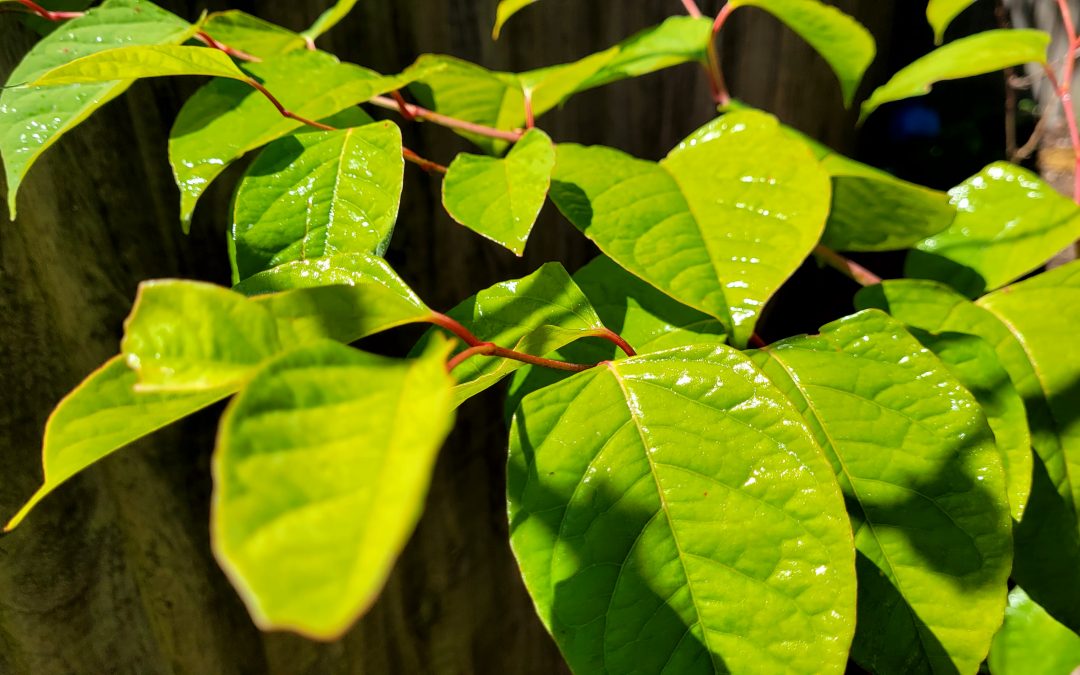Japanese knotweed used in Medicine
Japanese knotweed
has been used for traditional medicine purposes in some cultures, primarily in Asia. It is believed to have astringent, anti-inflammatory, and antioxidant properties, and has been used to treat a variety of health issues such as respiratory and gastrointestinal problems, cardiovascular disease, and skin disorders.
The most commonly used part of the plant for medicinal purposes is the root, which is harvested in the fall. The root can be dried and ground into a powder or used to make an infusion or decoction. The root can also be processed to extract specific compounds, such as resveratrol, which has been studied for its potential anti-inflammatory and anti-cancer effects.
It is important to note, however, that the use of Japanese knotweed for medicinal purposes is not widely accepted or regulated by modern medicine, and there is limited scientific evidence to support its effectiveness or safety. As with any herbal remedy, it is important to consult with a qualified healthcare provider before using Japanese knotweed for any health condition.
Traditional Chinese medicine (TCM),
Japanese knotweed roots, known as “Hu Zhang” or “Polygonum cuspidatum,” are used as a medicinal herb. Japanese knotweed has been a part of TCM for centuries, where it is known for its potential health benefits.
“Hu Zhang” is the Chinese name for a medicinal plant known as Japanese Knotweed in English.
The scientific name for this plant is “Reynoutria japonica.” It is a large, herbaceous perennial plant that is native to East Asia. In traditional Chinese medicine, “Hu Zhang” has been used for various purposes, including its potential anti-inflammatory and antioxidant properties. It’s important to note that while traditional medicine may ascribe certain benefits to this plant, scientific research is ongoing to better understand its potential uses and effects.
In TCM, Japanese knotweed roots are believed to have various properties, including being bitter, sour, and slightly cold in nature. The herb is commonly used to address conditions related to the liver, heart, and spleen, and it is considered to have actions such as promoting blood circulation, clearing heat, and resolving dampness.
One of the active compounds found in Japanese knotweed roots is resveratrol, which has gained attention in Western medicine for its potential antioxidant and anti-inflammatory properties. Resveratrol is also found in red wine and certain fruits, and some studies suggest it may have beneficial effects on cardiovascular health.
history of traditional
It is essential to note that while Japanese knotweed has a history of traditional use in TCM, the research on its safety and efficacy is still ongoing. As with any herbal remedy, it is crucial to consult a qualified healthcare professional before using Japanese knotweed or any other medicinal herb for therapeutic purposes. This is especially important because Japanese knotweed is an invasive species in many regions, and its use for herbal medicine should not encourage its spread in non-native environments.
Japanese knotweed has been used in traditional Chinese medicine
The root of the plant is the most commonly used part for medicinal purposes, as it is believed to contain high levels of resveratrol, a compound that has been studied for its potential health benefits. Resveratrol is a type of polyphenol that is also found in other plants, such as grapes and peanuts and has been shown to have anti-inflammatory, anti-cancer, and cardioprotective effects.
Japanese knotweed root can be consumed
in a variety of ways, including as a tea, tincture, or powder. It is also available in supplement form, either alone or in combination with other herbs or nutrients. However, it is important to note that there is limited scientific evidence to support the use of Japanese knotweed for medicinal purposes, and its safety and effectiveness have not been thoroughly studied.
In addition, Japanese knotweed is known to contain high levels of oxalic acid, which can interfere with the absorption of certain minerals and may contribute to the formation of kidney stones. As a result, it is not recommended for long-term use or people with certain medical conditions, such as kidney disease. It is important to consult with a qualified healthcare provider before using Japanese knotweed for any health condition.
